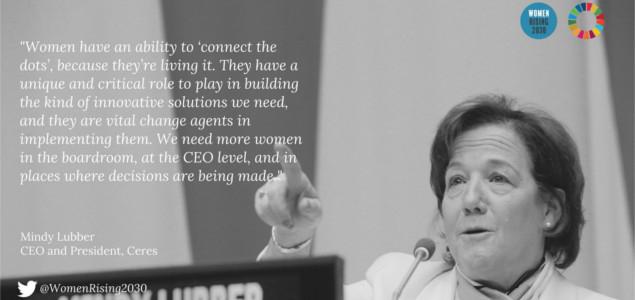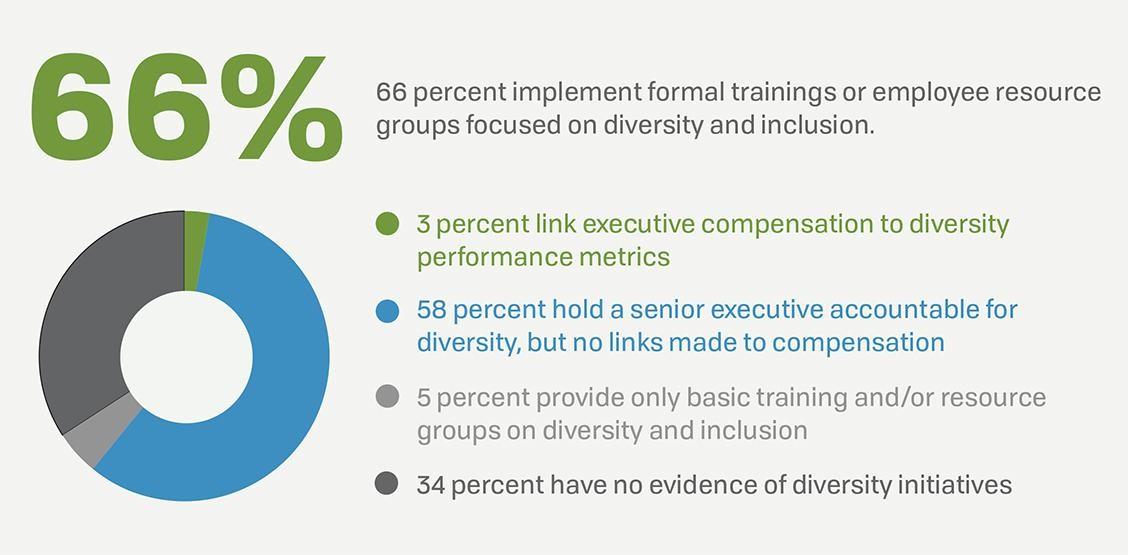Business Has Never Been More Critical in Advancing Gender Equality
by Kristen Lang
Originally published on Sustainable Brands
The adage, “behind every great man, there is a great woman,” has officially — and irretrievably — been relegated to the history books. In its place comes the understanding that behind every woman is a powerful and growing network of women who have, and are helping to, pave the way.
When I joined Ceres more than a decade ago, I was privileged to experience firsthand the power of working under a female CEO and a gender-balanced leadership team. Today, even as the organization has quintupled in size, Ceres maintains this gender parity.
From its start 30 years ago, Ceres has understood that women are integral in creating sustainability solutions at the community, governmental and economic levels — and that understanding grows more apparent as these challenges loom ever larger.
Two recent reports, both out just in time for women’s history month, look at diversity in leadership and what it means for the investment and corporate communities pivoting toward more sustainable decision-making.
Better Leadership, Better World: Women Leading for the Global Goals asserts that women holding “corporate decision-making positions” are not only positively influencing society and the environment, but also a company’s bottom line. This conclusion is supported by research coming out of firms such as McKinsey and Morgan Stanley finding that companies with stronger gender diversity are 15 percent more likely to outperform the national median, and that gender diversity can translate into “increased productivity, greater innovation, better decision-making, and higher employee retention and satisfaction.”
Released by Women Rising 2030, the new report features analysis showing that corporate boards with greater gender diversity are more apt to invest in renewable power generation and energy efficiency. It highlights women leaders in all sectors helping businesses gain crucial ground in reaching the UN Sustainable Development Goals (SDGs) and points to widespread positive impacts across all of the SDGs when companies commit fully to goal number five: gender equity.“Women have an ability to ‘connect the dots’, because they’re living it,” Ceres CEO and President Mindy Lubber told the report authors. “They have a unique and critical role to play in building the kind of innovative solutions we need, and they are vital change agents in implementing them. We need more women in the boardroom, at the CEO level and in places where decisions are being made.”
“Women business leaders have always been making concrete connections to climate action with the SDGs,” says Andrea Learned, a longstanding influencer in the climate action and women leadership spaces, and a Better Leadership, Better World contributor. “This means they’ve been creating these connective webs for a long time, patching in other women to tap and contribute to supportive networks and teams. Women are leading and activating business strategies felt from the bottom to the top. Corporations should have been following these women’s leads — yesterday.”
Ceres’ latest research, “TURNING POINT: Corporate Progress on the Ceres Roadmap for Sustainability,” notes that of the more than 600 publicly traded U.S. companies assessed, 66 percent “implement programs to build diversity and inclusion in the workplace.” And of those 406 companies committing to diversity, 93 percent hold senior executives accountable for improved diversity.
Despite these gains, change is not happening fast enough. Women in the U.S. still earn about 80 cents on the dollar compared to their male co-workers. And those cents pile up, with women losing up to $800,000 during an average lifespan. Even with the growing value of a diverse and inclusive workplace, few companies are taking the necessary steps to incentivize actual change in hiring and retention practices. Our analysis shows just 3 percent of the U.S. companies assessed link executive compensation to diversity performance metrics.
“The role of business has never been more critical in advancing gender equality,” said Heather Smith, lead sustainability research analyst at Impax Asset Management, LLC and Pax World Funds. “Ensuring that company leadership is held accountable — and linking compensation to the achievement of specific diversity metrics — is crucial if we want to accelerate the pace of change toward closing the overall gender gap in the workforce.”
Closing the gap will be more than just a talking point at the upcoming Ceres Conference, where women leaders will take to the stage to talk about positioning for success in the face of unprecedented environmental and social challenges. Influential women including Vien Truong, CEO of The Dream Corps; Marisa Buchanan, Deputy Global Head of Sustainable Finance at JPMorgan Chase and Company; and Daniella Foster, Senior Director of Global Corporate Responsibility at Hilton, will share their stories and expertise at the Ceres Conference 2018 in Boston from April 24-26.
There is no time like the present to hear from these women in leadership who are guiding the market toward a more sustainable future and redefining business as usual. Behind every great woman is a powerful and growing network of women who have, and are, helping to pave the way, and I am grateful and empowered to count myself among them.




